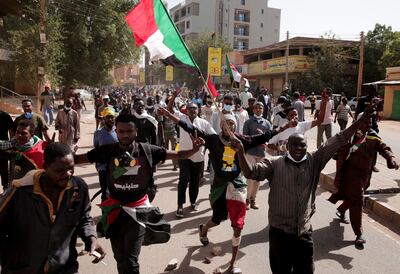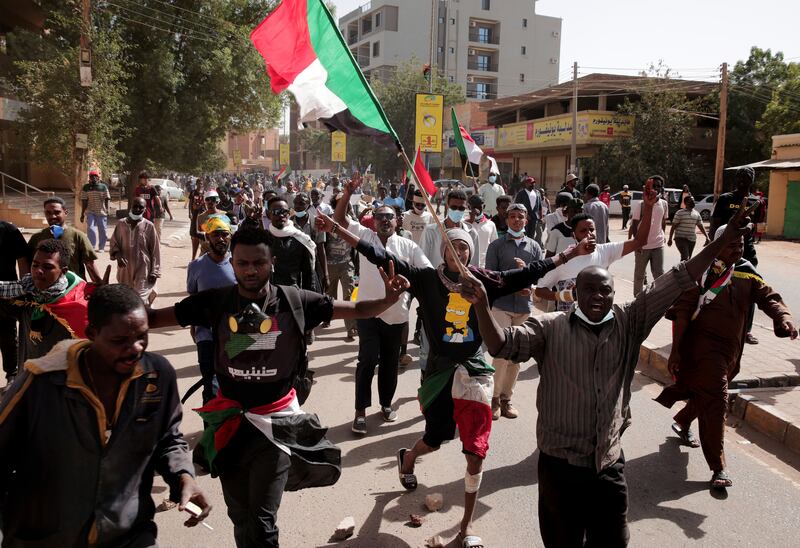Sudanese security forces shot dead seven protesters during antimilitary rallies on Monday, witnesses and a medical group aligned with the pro-democracy movement said.
Tens of thousands of people took to the streets of Khartoum dancing and singing in the latest round of rallies against military rule in Sudan, where an October 25 coup upended the country's democratic transition.
Thousands of soldiers and police were also out in force across the city, the witnesses said.
“The regime has committed another massacre and grand crime against the people of Sudan and their peaceful rallies,” said the Central Committee of Sudanese Doctors, whose thorough tallying and verification of victims of political violence has earned it a reputation of authority since 2018.
Scores sustained gunshot wounds on Monday, it said.
News of the latest deaths were followed by an announcement by an alliance of political parties for two days of civil disobedience starting on Tuesday.
“Let the period of civil disobedience be a time for regrouping and uniting our revolutionary forces and preparing them for the decisive battle to bring down the coup regime,” the alliance, the Forces of Freedom and Change, said in a statement.
The latest deaths take to 71 the number of protesters killed since a wave of mass demonstrations began, sparked by the October military coup. More than 2,000 have been injured,
UN mediators are pressing ahead with preparations for round-table negotiations to end the political crisis.

The military has accused the protesters of using violence, a charge denied by the pro-democracy movement, and something not backed by the pronouncements made by Sudan's western backers, who have consistently denounced the use of excessive force by security forces against peaceful protesters.
In a statement, the military-led Security and Defence Council spoke of the emergence of new “trends” that encouraged people to damage public property and praised the “wisdom” and “restraint” shown by security agencies and forces in dealing with the unrest.
The council consists of leaders of the military, police and the intelligence agency.
Its statement commended operatives of the much-feared intelligence agency for what it called pre-emptive strikes against terrorist cells.
Britain and France, meanwhile, were among nine UN Security Council members who urged all parties in Sudan to “exercise the utmost restraint” amid Monday's deadly violence.
“We express our serious concern about the military coup in Sudan on October 25, 2021", said the text, which was also signed by Mexico, Albania, Brazil, Gabon, Ghana, Ireland and Norway.
The statement, released after a meeting of the 15-member council, also urged all parties to “refrain from the use of violence and emphasise the importance of full respect for human rights, including the rights to peaceful assembly and freedom of expression".
The meeting involved Karim Khan, prosecutor of the International Criminal Court (ICC).
The UN mission in Sudan also strongly denounced Monday's violence, describing the use of live rounds by security forces as unacceptable.
“Violence must stop. We again call on authorities to cease using force against peaceful protesters and conduct credible investigations into such incidents,” it said on its Twitter account.
Monday’s protesters, many wearing masks to protect themselves from tear gas, struck an upbeat mood earlier in the day as they danced and sang along to revolutionary songs that blared out of giant loudspeakers.
They waved Sudanese flags and carried banners bearing the images of protesters killed by security forces during the past three months of protests. Demonstrators used bricks, rocks and burnt tyres to block roads while chanting slogans against army chief and coup leader Gen Abdel Fattah Al Burhan.
“Civilian!” they shouted, referring to their demand for civilian rule.

Videos widely shared online on Monday showed heavy clouds of tear gas hanging over protesters, many of whom can be seen taking cover behind metal barriers as the sound of gunfire rings out in the background.
“Don't stand still or you will be shot,” a protester is heard yelling at others in one of the videos.
The three major pro-democracy groups — the Forces of Freedom and Change, the Sudanese Professionals’ Association and the Resistance Committees — say they are willing to engage with the UN-sponsored process but will not have any dealings with the military, whose withdrawal from politics must be included in any negotiated end to the crisis.
Those groups were behind the uprising that toppled Omar Al Bashir’s regime in 2019 and have again taken the lead in the current antimilitary movement.
In a break with past tactics, authorities left all Nile bridges open on Monday except for one on the Blue Nile that connects Khartoum with Bahri. The bridge leads directly to the Republican Palace, on the riverbank.
Authorities blocked all roads leading to the palace and the headquarters of the armed forces in central Khartoum.
Organisers of Monday’s rallies instructed participants to march to the palace peacefully and to avoid provoking security forces, but the marchers were expected to draw a violent response.
The Interior Ministry said a senior police officer on duty during the last round of rallies on Thursday was stabbed to death by protesters. It was the first fatality among the security forces in three months of unrest.







